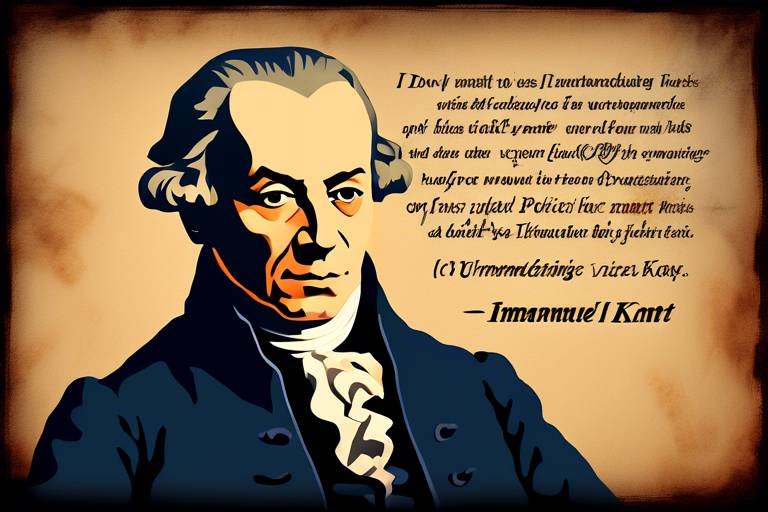The Potential of Philosophy in Developing Ethical Policies
In a world where the complexities of human interaction and societal norms are ever-evolving, the need for ethical policies has never been more pressing. Philosophy, with its rich tapestry of ideas and theories, offers a profound toolkit for navigating these challenges. Imagine trying to steer a ship through turbulent waters without a compass; that’s akin to policy-making without ethical guidance. By integrating philosophical principles into policy formulation, we can create frameworks that not only address contemporary moral dilemmas but also promote a more just and equitable society.
At its core, philosophy encourages us to ask the tough questions: What does it mean to do the right thing? How do we weigh the interests of different groups? These inquiries are not just academic; they are essential for crafting policies that resonate with the values of the community. For instance, when we consider the implications of a new law, we must reflect on its impact on various stakeholders. This is where philosophical theories come into play, providing us with the lenses through which we can assess the ethical dimensions of our decisions.
Moreover, the application of philosophical thought can foster a culture of accountability and transparency in governance. By grounding policies in ethical principles, we encourage leaders to think deeply about their responsibilities and the consequences of their actions. This approach not only cultivates trust among the populace but also empowers individuals to engage in the democratic process, knowing that their voices matter in shaping the ethical landscape of their society.
In essence, the potential of philosophy in developing ethical policies is vast. It challenges us to transcend mere compliance with laws and regulations, urging us instead to strive for a higher standard of moral integrity. As we embark on this journey, we must remain open to dialogue, continuously refining our understanding of what constitutes ethical behavior in an increasingly complex world. By doing so, we can ensure that our policies not only serve the present but also lay the groundwork for a more equitable future.
Ethics serves as the foundation for policy making, ensuring that decisions are made based on moral principles. This section discusses the significance of ethical considerations in shaping effective and responsible policies.
Various philosophical theories, such as utilitarianism and deontology, offer frameworks for evaluating ethical dilemmas. This section examines how these theories can be applied to real-world policy issues.
Utilitarianism emphasizes the greatest good for the greatest number. This subheading explores how this principle can guide policy makers in making decisions that benefit the majority while considering potential trade-offs.
While utilitarianism provides a clear framework, it also faces challenges, such as neglecting minority rights. This section discusses these challenges and their implications for ethical policy development.
Examining real-life examples of policies based on utilitarian principles can provide insights into their effectiveness and ethical considerations. This section analyzes notable case studies.
Deontological ethics focuses on duty and rules. This subheading discusses how these principles can inform policies that prioritize justice, rights, and moral obligations.
Engaging stakeholders in the policy-making process is crucial for ethical governance. This section emphasizes the need for inclusive dialogue to ensure diverse perspectives are considered.
This subheading explores various methods for engaging stakeholders, including public forums and surveys, to gather valuable input that can shape ethical policies.
Finding a balance between competing interests and ethical standards is essential. This section discusses strategies for achieving this balance in policy formulation.
- What is the role of philosophy in policy-making? Philosophy provides a framework for ethical decision-making, guiding policymakers to consider moral implications and societal impacts.
- How can utilitarianism be applied in real-world policies? Utilitarianism can help policymakers evaluate the consequences of their decisions, aiming for outcomes that maximize overall happiness.
- What are the challenges of applying ethical theories? Challenges include potential conflicts between majority benefits and minority rights, as well as differing interpretations of ethical principles.
- Why is stakeholder engagement important? Engaging stakeholders ensures that diverse perspectives are considered, leading to more inclusive and effective policies.

The Role of Ethics in Policy Making
When we dive into the world of policy making, one thing becomes abundantly clear: ethics is the backbone of every decision made. Just like a compass guiding a ship through uncharted waters, ethical considerations help navigate the complex and often murky realms of governance. Policies crafted without a strong ethical foundation can lead to disastrous consequences, from public distrust to societal inequities. So, why is ethics so crucial in this arena? It’s simple: ethical policies foster a sense of justice, accountability, and respect for human rights.
At its core, ethical policy making means that decisions are not just about numbers and statistics; they involve human dignity and the well-being of individuals. For instance, when a government considers implementing a new healthcare policy, it’s not just about balancing budgets or maximizing profits. It’s about ensuring that every citizen has access to necessary medical services, especially the vulnerable populations who might otherwise be left behind. Here, ethics serves as the guiding principle, ensuring that policies are not only effective but also just.
Moreover, ethical considerations help in building public trust. When citizens see that their leaders are committed to making decisions based on moral principles rather than self-interest, it creates a sense of confidence in the system. This trust is pivotal in democratic societies, where the legitimacy of governance relies heavily on the perception of fairness and justice. Without ethics, policies can quickly become tools of oppression, favoring certain groups over others and leading to widespread discontent.
Incorporating ethics into policy making also involves recognizing the diverse values and beliefs of a society. A one-size-fits-all approach rarely works, as different communities have unique needs and perspectives. Therefore, engaging with various stakeholders—be it community leaders, activists, or the general public—is essential. This engagement not only enriches the policy-making process but also ensures that multiple viewpoints are considered, leading to more comprehensive and inclusive policies.
To illustrate the significance of ethics in policy making, let’s consider a few key points:
- Guiding Framework: Ethics provide a framework for evaluating the potential impacts of policies on different segments of society.
- Accountability: Ethical policies promote accountability, ensuring that decision-makers are held responsible for their actions.
- Long-term Vision: Ethical considerations encourage a long-term perspective, focusing on sustainable outcomes rather than short-term gains.
In conclusion, the role of ethics in policy making cannot be overstated. It is essential for creating policies that are not only effective but also fair and just. As we move forward in an increasingly complex world, prioritizing ethical considerations in our governance will be vital in fostering a society that values justice, equity, and respect for all individuals.

Philosophical Theories and Their Applications
When we dive into the world of ethics, we find ourselves surrounded by a multitude of philosophical theories that serve as guiding lights in the murky waters of moral dilemmas. Each theory brings its own unique perspective, offering tools to navigate the complexities of ethical policy-making. Understanding these theories is crucial because they not only help us evaluate our decisions but also shape the very fabric of our society. So, how do these theories translate into real-world applications? Let’s explore some of the most influential ones: utilitarianism and deontology.
Utilitarianism, often summarized by the phrase "the greatest good for the greatest number," pushes policymakers to consider the outcomes of their decisions. It encourages a focus on maximizing overall happiness and minimizing suffering. Imagine a city considering a new public transportation system. A utilitarian approach would assess how many people benefit from reduced commute times and lower emissions versus the costs incurred by a minority who may be displaced. This perspective can lead to policies that prioritize the majority's welfare, but it also raises critical questions about the rights of those in the minority. How do we ensure that their voices are heard and their needs addressed?
On the flip side, we have deontological ethics, which is all about rules and duties. Rather than focusing on outcomes, deontology emphasizes the importance of adhering to moral principles. For instance, when crafting policies related to human rights, a deontological approach would insist on upholding individual rights regardless of the potential benefits or harms. This theory reminds us that some actions are inherently wrong, regardless of their consequences. Think about it: if a policy infringes on individual rights for the sake of greater good, is it truly ethical? This is where the balance between utilitarianism and deontology becomes crucial.
To illustrate the application of these theories, let’s consider a table that compares their core tenets and implications in policy-making:
| Philosophical Theory | Core Principle | Policy Implication |
|---|---|---|
| Utilitarianism | Maximize overall happiness | Focus on outcomes and benefits for the majority |
| Deontology | Adhere to moral rules and duties | Prioritize individual rights and justice |
Both of these theories offer valuable insights, but they also come with their own sets of challenges and criticisms. For instance, while utilitarianism can lead to policies that benefit the majority, it often overlooks the needs and rights of minorities. This can result in policies that are efficient but unjust. On the other hand, deontological ethics may lead to rigid policies that fail to consider the practical implications of decisions. So, how do we strike a balance? The answer lies in engaging diverse stakeholders in the policy-making process, ensuring that various perspectives are included in the conversation.
In conclusion, the application of philosophical theories in ethical policy-making is not just an academic exercise; it has real-world implications that affect the lives of individuals and communities. By understanding and applying these theories, we can create policies that are not only effective but also just and equitable. As we continue to navigate the complexities of modern society, the integration of these philosophical perspectives will be essential in fostering a more ethical and inclusive governance.

Utilitarianism in Policy Development
Utilitarianism, a philosophy that advocates for actions that promote the greatest happiness for the greatest number, serves as a powerful tool in the realm of policy development. Imagine a world where every decision made by policymakers is rooted in the principle of maximizing overall well-being. This approach encourages leaders to prioritize outcomes that benefit the majority, creating a framework for policies that can transform societies. However, the beauty of utilitarianism lies not only in its simplicity but also in its complexity, as it forces us to confront the often uncomfortable trade-offs inherent in decision-making.
To illustrate how utilitarianism can guide policy development, consider the following key aspects:
- Maximizing Welfare: Policies grounded in utilitarian principles focus on enhancing the welfare of the population. For instance, when developing healthcare policies, a utilitarian approach would prioritize treatments and resources that yield the highest health benefits for the largest number of people.
- Cost-Benefit Analysis: Utilitarianism encourages policymakers to conduct thorough cost-benefit analyses, weighing the potential benefits of a policy against its costs. This analytical approach ensures that resources are allocated efficiently and effectively.
- Long-Term Impacts: A utilitarian perspective also emphasizes the importance of considering the long-term consequences of policies. For example, investing in renewable energy sources may have higher initial costs but can lead to greater environmental and economic benefits in the future.
However, while utilitarianism provides a clear framework for guiding policy decisions, it is not without its challenges. One significant concern is the potential for the rights of minorities to be overlooked in the pursuit of the greater good. For instance, if a policy decision benefits 90% of the population but severely harms a small minority, is it truly ethical? This dilemma highlights the need for a nuanced application of utilitarian principles, where the voices of all stakeholders are considered, ensuring that no group is unjustly marginalized.
Real-world examples of utilitarian policies can shed light on both their effectiveness and ethical implications. For instance, consider the implementation of a public smoking ban in a city. While this policy may inconvenience a minority of smokers, the overall public health benefits—reduced healthcare costs, improved air quality, and enhanced quality of life for non-smokers—illustrate a classic utilitarian approach in action. Such case studies not only validate the utilitarian framework but also provoke discussions about the ethical boundaries of sacrificing individual freedoms for collective benefits.
In conclusion, utilitarianism in policy development acts as a compass guiding policymakers toward decisions that prioritize the well-being of the majority. Yet, it also necessitates a careful balance, ensuring that the rights and needs of all individuals are respected. As we navigate complex social issues, embracing utilitarian principles can lead to more effective and just policies, fostering a society where everyone can thrive.

Challenges of Utilitarian Approaches
While utilitarianism offers a compelling framework for decision-making in policy development, it is not without its challenges. One of the most significant issues is the potential for **neglecting minority rights**. In the quest to achieve the greatest good for the greatest number, there is a risk that the needs and interests of smaller groups may be overlooked or outright disregarded. This can lead to policies that, while beneficial for the majority, may impose undue hardships on vulnerable populations.
Another challenge lies in the **difficulty of quantifying happiness** or well-being. How do we measure the benefits and harms of a policy? What metrics do we use to evaluate the outcomes? The subjective nature of happiness makes it a slippery concept to pin down, leading to potential inconsistencies in policy evaluation. For instance, a policy that increases overall happiness might simultaneously decrease the happiness of a minority, raising ethical questions about whose happiness counts more.
Moreover, utilitarianism can sometimes promote a **short-term focus** over long-term sustainability. Policymakers may be tempted to implement solutions that yield immediate benefits, even if these solutions are not in the best interest of society in the long run. This short-sightedness can lead to a cycle of reactive policymaking, where decisions are made based on current pressures rather than thoughtful consideration of future implications.
Finally, the **distribution of benefits and burdens** poses another significant challenge. Utilitarianism advocates for maximizing overall happiness, but it does not inherently address how that happiness is distributed among the population. Policies that aggregate benefits might favor certain demographics while marginalizing others, leading to increased inequality and social tension. For example, a policy that improves public transportation may greatly benefit urban dwellers but could leave rural communities even more isolated.
In summary, while utilitarian approaches provide a structured way to evaluate policy decisions, they also come with complexities that cannot be ignored. Policymakers must navigate these challenges carefully to ensure that their decisions are not only effective but also ethical and equitable.
- What is utilitarianism? Utilitarianism is a philosophical theory that suggests actions are right if they promote the greatest happiness for the greatest number of people.
- What are the main criticisms of utilitarianism? The main criticisms include its potential to neglect minority rights, difficulty in measuring happiness, a short-term focus, and issues with the distribution of benefits and burdens.
- How can policymakers address the challenges of utilitarianism? Policymakers can address these challenges by incorporating diverse perspectives, ensuring equitable distribution of benefits, and considering long-term impacts in their decision-making processes.

Case Studies of Utilitarian Policies
Utilitarianism, the ethical theory that advocates for actions that promote the greatest good for the greatest number, has been a guiding principle in various policy decisions around the globe. Examining case studies can provide a clearer understanding of how utilitarian principles are applied in real-world scenarios, illustrating both their effectiveness and the ethical dilemmas they may pose. One notable example is the implementation of public health policies, particularly during health crises, where the focus is often on maximizing overall well-being.
Consider the case of vaccination programs. In many countries, governments have adopted policies that mandate vaccinations for children, aiming to achieve herd immunity. This approach is grounded in utilitarian ethics as it seeks to protect the larger population from preventable diseases, thereby ensuring the greatest health benefit for the majority. However, this raises important questions regarding individual rights and parental autonomy. While the policy aims to benefit the collective, it can inadvertently marginalize those who may have legitimate concerns about vaccine safety. Thus, while the intent is to serve the greater good, the challenge lies in addressing the needs of minority groups without compromising public health goals.
Another compelling case study can be found in environmental policy, specifically in the context of climate change. Governments worldwide are increasingly adopting utilitarian approaches to address environmental issues, often favoring policies that reduce carbon emissions for the benefit of future generations. For instance, the introduction of carbon taxes is designed to encourage businesses and individuals to lower their carbon footprints. The underlying philosophy is that by imposing a cost on carbon emissions, society can achieve a significant reduction in greenhouse gases, benefiting the planet and its inhabitants in the long run.
However, the implementation of such policies is not without controversy. Critics argue that carbon taxes can disproportionately affect lower-income households, raising ethical concerns about equity. This highlights a fundamental challenge in utilitarian policymaking: the need to balance the overall benefits to the majority with the rights and welfare of minority populations. In this case, policymakers must navigate the complexities of economic disparity while striving to achieve environmental sustainability.
To further illustrate these points, we can examine a table that summarizes key case studies of utilitarian policies:
| Case Study | Utilitarian Principle Applied | Ethical Challenges |
|---|---|---|
| Vaccination Programs | Herd immunity for public health | Individual rights vs. collective safety |
| Carbon Tax Policies | Reducing carbon emissions for future generations | Economic impact on low-income households |
| Public Transportation Initiatives | Reducing traffic congestion and pollution | Access for marginalized communities |
Lastly, the case of public transportation initiatives emphasizes the utilitarian goal of reducing traffic congestion and minimizing environmental impact. By investing in public transit systems, cities can enhance mobility for the majority while also addressing issues like air quality. However, the challenge remains in ensuring that these services are accessible to all, particularly marginalized communities who may rely on them the most. Thus, while utilitarian policies can drive significant improvements, they must be carefully crafted to avoid unintended consequences that could undermine their ethical foundations.
In conclusion, the exploration of case studies reveals that while utilitarianism provides a robust framework for policy development, it also necessitates a nuanced approach to ethical considerations. Policymakers must remain vigilant in recognizing the potential trade-offs involved and strive to create inclusive policies that truly serve the greater good.
- What is utilitarianism? Utilitarianism is an ethical theory that advocates for actions that maximize overall happiness or well-being for the greatest number of people.
- How do case studies help in understanding utilitarian policies? Case studies provide real-world examples of how utilitarian principles are applied, highlighting both their impact and the ethical dilemmas they may create.
- What are some ethical challenges associated with utilitarian policies? Ethical challenges include the potential neglect of minority rights, economic disparities, and the balancing of individual freedoms with collective benefits.

Deontological Ethics in Governance
When we dive into the world of deontological ethics, we’re stepping into a framework that emphasizes duty, rules, and the inherent morality of actions themselves. Unlike utilitarianism, which focuses on the outcomes of actions, deontological ethics reminds us that some actions are simply right or wrong, regardless of their consequences. This perspective is crucial in the realm of governance, where the stakes are high and the impact of decisions can be profound.
In a governance context, deontological principles can guide policymakers to prioritize justice, rights, and moral obligations. For instance, when formulating laws or regulations, officials are often faced with choices that could benefit the majority at the expense of a minority. Deontological ethics would advocate for a careful consideration of the rights of those who may be adversely affected, ensuring that policies do not infringe upon fundamental human rights, regardless of the potential benefits to the majority.
One of the core tenets of deontological ethics is that certain actions are morally obligatory. For example, a government has a duty to protect its citizens and uphold their rights. This means that even if a policy could lead to greater overall happiness, if it compromises individual rights or justice, it would be considered unethical. This principle can be illustrated through a few key areas in governance:
- Human Rights Protection: Policies must respect and protect the inherent rights of all individuals, regardless of the situation.
- Transparency and Accountability: Governance should be conducted openly, ensuring that officials are held accountable for their actions.
- Equity in Law: Laws should apply equally to all individuals, ensuring that no group is unfairly targeted or favored.
However, applying deontological ethics in governance is not without its challenges. Policymakers often grapple with situations where duties conflict. For instance, a law designed to protect public safety might infringe upon personal freedoms. In such cases, the challenge lies in determining which duty takes precedence. This dilemma underscores the importance of continuous dialogue and ethical deliberation in the policy-making process.
Moreover, the rigidity of deontological ethics can sometimes lead to outcomes that appear harsh or impractical. For example, a strict adherence to rules may prevent necessary flexibility in crisis situations. To address these complexities, policymakers can integrate deontological principles with other ethical frameworks, allowing for a more nuanced approach that respects duties while also considering the broader context of each situation.
In conclusion, deontological ethics provides a vital foundation for governance by emphasizing the importance of duty and moral principles. By prioritizing justice, rights, and moral obligations, policymakers can create a framework that not only guides ethical decision-making but also fosters trust and integrity within the government. As we navigate the intricate landscape of governance, the challenge remains to uphold these ethical standards while adapting to the ever-changing needs of society.
Q: What is deontological ethics?
A: Deontological ethics is a moral framework that focuses on the inherent rightness or wrongness of actions, rather than the outcomes they produce. It emphasizes duties and rules that govern ethical behavior.
Q: How does deontological ethics apply to governance?
A: In governance, deontological ethics guides policymakers to prioritize justice, individual rights, and moral obligations, ensuring that laws and regulations respect the inherent dignity of all individuals.
Q: What are some challenges of applying deontological ethics in policy making?
A: Challenges include conflicts between duties, the potential rigidity of rules, and the need for flexibility in crisis situations. Policymakers must navigate these complexities while maintaining ethical standards.
Q: Can deontological ethics be combined with other ethical frameworks?
A: Yes, integrating deontological principles with other ethical frameworks, such as utilitarianism, can provide a more balanced approach that respects duties while considering broader societal impacts.

The Importance of Stakeholder Engagement
When it comes to crafting ethical policies, one cannot overstate the importance of stakeholder engagement. Imagine trying to build a bridge without consulting the engineers, the community, or even the traffic patterns. It would be a recipe for disaster! Engaging stakeholders ensures that the voices of those affected by policies are heard, fostering trust and collaboration. Stakeholders can include a diverse range of individuals and groups, such as community members, businesses, non-profit organizations, and government entities. Each of these players brings unique perspectives and insights that can help shape policies that are not only effective but also just.
Involving stakeholders in the policy-making process is not just a matter of courtesy; it’s a crucial step in ensuring that decisions are made with a full understanding of their implications. When stakeholders are engaged, they can provide valuable feedback that highlights potential pitfalls or unintended consequences that policymakers may not have considered. This collaborative approach can lead to more innovative solutions and a greater sense of ownership among those impacted by the policies.
Moreover, stakeholder engagement can enhance the legitimacy of policies. When people feel that their opinions matter, they are more likely to support and comply with the resulting policies. This is especially important in today’s world, where skepticism towards institutions is high. By actively involving stakeholders, policymakers can demonstrate their commitment to transparency and accountability, which can significantly boost public trust.
However, effective stakeholder engagement is not without its challenges. Policymakers must navigate diverse opinions and interests, often balancing conflicting priorities. To manage this complexity, it is essential to establish clear communication channels and create an inclusive environment where all stakeholders feel comfortable sharing their thoughts. Techniques such as public forums, focus groups, and surveys can be instrumental in gathering input from a broad audience.
To illustrate the importance of stakeholder engagement, let’s consider a hypothetical scenario: a city planning to implement a new public transportation system. If city officials only consult transportation experts and neglect to engage local residents, they may overlook crucial factors such as accessibility for the elderly or the needs of low-income communities. By engaging a wide range of stakeholders—from commuters to local businesses—policymakers can design a system that truly serves the community’s needs, ultimately leading to higher usage rates and satisfaction.
In conclusion, stakeholder engagement is not merely a checkbox in the policy-making process; it is a vital component that can lead to more ethical, effective, and equitable policies. By fostering open dialogue and collaboration, policymakers can ensure that diverse perspectives are considered, resulting in decisions that reflect the values and needs of the entire community.
- Why is stakeholder engagement important in policy-making? Stakeholder engagement is crucial because it ensures diverse perspectives are considered, leading to more effective and equitable policies.
- How can stakeholders be effectively engaged? Stakeholders can be engaged through public forums, surveys, and focus groups, allowing for open communication and feedback.
- What are the challenges of stakeholder engagement? Challenges include balancing conflicting interests, ensuring inclusivity, and managing diverse opinions.

Methods for Effective Stakeholder Consultation
Engaging stakeholders in the policy-making process is not just a formality; it's a crucial step toward ensuring that the policies developed are not only effective but also resonate with the community they aim to serve. So, how do we go about this? There are several methods that can be employed to ensure that stakeholder consultation is both inclusive and productive. First and foremost, public forums serve as a fantastic platform for dialogue. These forums allow stakeholders to voice their opinions, ask questions, and engage in discussions with policymakers directly. Imagine a town hall meeting where community members come together to discuss pressing issues; the energy in the room can lead to innovative ideas and solutions.
Another effective method is the use of surveys. Surveys can be distributed widely and provide a means to gather quantitative data on stakeholder opinions. They can be designed to cover a range of topics, from specific policy proposals to general attitudes toward governance. The beauty of surveys lies in their ability to reach a broad audience, ensuring that even those who may not feel comfortable speaking up in a public forum can still have their voices heard. When analyzing survey results, it’s essential to present the data in a clear and accessible format. For instance, consider the following table that summarizes potential survey questions and the insights they can provide:
| Survey Question | Purpose |
|---|---|
| How satisfied are you with current policies? | Gauge general sentiment toward existing policies |
| What issues do you feel are most pressing? | Identify key areas of concern among stakeholders |
| How would you rate the effectiveness of stakeholder engagement? | Assess perceptions of the consultation process |
In addition to public forums and surveys, focus groups can provide deeper insights into stakeholder perspectives. These smaller, more intimate discussions allow for a deeper dive into specific issues. Participants can express their thoughts freely, and the facilitator can probe further to uncover underlying concerns or motivations. This method can be particularly useful when dealing with complex issues where nuance is critical. Think of it as a brainstorming session where every voice matters.
However, it's not just about gathering opinions; it’s also about creating a feedback loop. Once stakeholders have provided their input, it’s vital to communicate how their feedback has influenced policy decisions. This transparency builds trust and encourages ongoing engagement. For instance, sending out summary reports or holding follow-up meetings can demonstrate that stakeholder voices are valued and taken seriously.
Finally, leveraging digital platforms can enhance stakeholder engagement, especially in our increasingly connected world. Online platforms can facilitate discussions, share documents, and even host virtual meetings, making it easier for stakeholders to participate regardless of their physical location. Social media can also be a powerful tool for outreach, allowing policymakers to connect with a wider audience and gather opinions in real time.
In summary, effective stakeholder consultation involves a mix of traditional and modern methods. By utilizing public forums, surveys, focus groups, feedback loops, and digital platforms, policymakers can create an inclusive environment that fosters meaningful dialogue. This not only leads to more ethical policy development but also empowers communities by ensuring their voices are heard and valued.
- What is the importance of stakeholder consultation? Stakeholder consultation is essential for gathering diverse perspectives, fostering trust, and ensuring that policies are relevant and effective.
- How can I participate in stakeholder consultations? You can participate by attending public forums, completing surveys, or joining focus groups organized by policymakers.
- What are some common challenges in stakeholder consultation? Common challenges include ensuring diverse representation, managing conflicting interests, and effectively communicating outcomes.

Balancing Interests and Ethical Standards
Finding the right equilibrium between competing interests and ethical standards is akin to walking a tightrope—one misstep can lead to disastrous consequences. In the realm of policy-making, this balance is crucial, as it ensures that decisions are not only effective but also morally sound. Think about it: when policies are crafted without considering ethical implications, they risk alienating certain groups, undermining trust, and ultimately failing to achieve their intended goals. So, how can policy makers navigate this complex landscape?
First and foremost, it’s essential to recognize that interests can vary widely among stakeholders. For instance, in a community facing a housing crisis, some may prioritize affordable housing, while others might be concerned about property values. This divergence can create tension, making it imperative for policy makers to engage in active listening and dialogue. By fostering an environment where all voices are heard, decision-makers can better understand the nuances of each interest, paving the way for solutions that honor ethical principles.
Moreover, employing a framework for ethical decision-making can provide clarity when interests clash. A useful approach is the Triple Bottom Line framework, which evaluates policies based on three pillars: social, environmental, and economic impacts. By assessing how a policy affects each of these areas, decision-makers can make more informed choices that respect ethical standards while balancing the interests at play. For example, a policy that promotes economic growth should also consider its social implications—such as displacement of low-income residents—and environmental impacts, ensuring that the benefits do not come at an unacceptable cost.
Another effective strategy involves the use of impact assessments. These assessments can help identify potential conflicts between interests and ethical standards before a policy is implemented. By analyzing the effects of proposed policies on various stakeholders, policymakers can anticipate backlash and make adjustments accordingly. This proactive approach not only mitigates risks but also demonstrates a commitment to ethical governance, building trust among constituents.
In addition, it’s essential to embrace transparency throughout the policy-making process. When stakeholders are kept in the loop about how decisions are made and the criteria used to evaluate competing interests, it fosters a sense of ownership and accountability. This transparency can also help demystify the decision-making process, allowing citizens to see how ethical standards are upheld, even in complex scenarios. Ultimately, a transparent approach can lead to more robust and equitable policies, as stakeholders feel valued and understood.
Lastly, it’s crucial to recognize that balancing interests and ethical standards is not a one-time effort; it requires ongoing evaluation and adaptation. As societal values evolve and new challenges arise, policies must be revisited to ensure they remain relevant and just. This adaptability is key to maintaining ethical integrity in governance, allowing policymakers to respond effectively to the changing landscape.
In summary, balancing interests and ethical standards is a multifaceted challenge that necessitates active engagement, ethical frameworks, impact assessments, transparency, and adaptability. By embracing these principles, policymakers can create a more just and equitable society, where diverse interests are respected and ethical standards are upheld. The journey may be complex, but the rewards—a fairer society and enhanced trust in governance—are well worth the effort.
- What is the importance of balancing interests and ethical standards in policy-making?
Balancing interests and ethical standards ensures that policies are not only effective but also morally sound, fostering trust and equity in governance.
- How can stakeholders be engaged in the policy-making process?
Stakeholders can be engaged through public forums, surveys, and open discussions that allow for diverse perspectives to be heard and considered.
- What frameworks can be used to evaluate ethical dilemmas in policy-making?
Frameworks like the Triple Bottom Line and impact assessments can help policymakers navigate the complexities of competing interests and ethical standards.
Frequently Asked Questions
- What is the role of ethics in policy making?
Ethics serves as the backbone of policy making, ensuring that decisions are grounded in moral principles. It helps policymakers navigate complex issues by providing a framework for evaluating the impact of their choices on society, ensuring that they prioritize fairness and justice.
- How can philosophical theories influence ethical policies?
Philosophical theories like utilitarianism and deontology offer valuable frameworks for assessing ethical dilemmas. Utilitarianism focuses on achieving the greatest good for the majority, while deontology emphasizes adherence to moral duties and rules. By applying these theories, policymakers can develop more thoughtful and effective ethical policies.
- What are some challenges associated with utilitarian approaches?
While utilitarianism provides a clear path for decision-making, it often faces criticism for potentially overlooking the rights of minorities. This can lead to policies that favor the majority at the expense of vulnerable groups, raising important ethical concerns about fairness and justice.
- Can you provide examples of utilitarian policies?
Sure! Notable case studies include public health initiatives that aim to maximize community health benefits, such as vaccination programs. These policies are designed to protect the majority, but they also require careful consideration of individual rights and ethical implications.
- What is deontological ethics and how does it apply to governance?
Deontological ethics focuses on the importance of duty and adherence to moral rules. In governance, this approach informs policies that prioritize justice and individual rights, ensuring that ethical obligations are met regardless of the outcomes.
- Why is stakeholder engagement important in policy-making?
Engaging stakeholders is crucial for ethical governance as it fosters inclusive dialogue and ensures that diverse perspectives are considered. This helps create policies that reflect the values and needs of the community, leading to more equitable outcomes.
- What methods can be used for effective stakeholder consultation?
Effective methods for stakeholder consultation include public forums, surveys, and focus groups. These tools allow policymakers to gather valuable feedback and insights from the community, which can significantly shape ethical policies.
- How can policymakers balance competing interests and ethical standards?
Finding a balance requires careful deliberation and negotiation. Strategies may include prioritizing transparency, fostering open communication, and considering the long-term impacts of decisions on all stakeholders involved, ensuring that ethical standards are upheld.



















